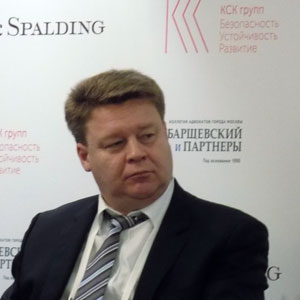On November 11, 2016, a conference “Arbitration in Russia to 2016: what happens next?” took place at the Moscow MARRIOTT Royal Aurora, the organizer was the publishing house “Kommersant”. Many of speeches of the leading specialists in the arbitration concerned the Russian arbitrage law and its place in the international scene.
According to a vice-President of the Chamber of Industry and Commerce of the Russia, Vadim Chubarov, a reform of arbitrage, which entered into force on November 1 2016, had “the purpose to make the Russian arbitrage maximally attractive,” and it was aimed at attracting “the cases of foreign companies were arbitrated by our court with the involvement of foreign arbitrators”. Where should a company address to resolve an with the participants of foreign trade transactions and how to reach a judgement execution?
Those who are engaged in or intend to start the foreign trade activities, it is important to understand that arbitrage has a minimum threshold of a contract sum. If a contract sum is less than 100’000 USD, it is economically inefficient to contact such intermediary. The involvement of eminent international arbitrators or reputable companies is recommended, starting from the contract amount of 400’000 USD.
Today, the image of the Russian arbitrage leaved much to be desired in the international market. However, as noted by the Chairman of the Arbitration court at the autonomous non-commercial organization “Independent arbitration chamber”, “I share the concern about the current posture of affairs”, although “today, there are lawyers that can adequately represent the interests in the international arena: Gubin E. P., Bodrova, Skvortsova, etc”. That is, the problem is not so much in personnel, but in creation of a system of arbitration.
A part of Russian lawyers and companies fell under the economic sanctions, which have also had an impact on the reputation of the Russian courts. According to the presentation V. Khvaley, the Chairman of the Board of the Russian Arbitration Association (RAA), a negative effect primarily affected the banking system (in Russian arbitration payments, it affected the fee payment, the payment of which is now longer checked). Moreover, the arbitrators think of the Russian issues to be risky, and also, they have problems with the initiation. Taking into account that the application of the law can be crried out in the country of sanctions applied, the disputes are settled more frequently by mutual agreement. And, of course, “there are a number of companies who are consistently at risk”.
We asked an expert some questions about the perception of the Russian arbitrage in the world, and also about some of the export issues that are important for Russian businessmen. Below is an interview with Vladimir Hvaley.
EV: How do You assess the reform of the arbitrage system, is it a step towards integration of the Russian arbitrage in the international system?
Vladimir Khvaley: Yes, of course, it is so. Overall, I appreciate the innovations positively. But I’m more worried about what did not. The country’s attractiveness from the point of view of arbitrage is ensured not so much the laws but the judicial practice and its application. And here arbitration reform, unfortunately, the judicial practice does nothing.
Many things could be done and, some proposals have been voiced from the arbitration Association on the basis of the experience of other countries.
First, if we talk about international arbitrage, a disparate judicial practice is due to the fact that Russia is a large country, it has many different courts and it is difficult to teach the judges all the international arbitrage issues across the country. For example, we proposed to concentrate all questions of supervision and control over the international arbitrage in one place – in Moscow, and to raise the level of judicial control from the first instance to appeal and cassation. For example, there is such an experience in France, where the Appeals court of Paris is engaged in international arbitrage. A similar system exists in Sweden, where the Appeals court of Stockholm exists. Many countries raise the level of judicial representation, and the judges are more competent, and this improves the quality of the court as a whole, and no weird decisions are taken. Because when there are strange decisions in arbitrage, everyone panics. Unfortunately, our proposal, has not passed.
Secondly, we proposed to use the experience of China. Previously, China was criticized for the fact that they have an unstable practice on enforcement of international arbitral awards, and there were many unreasonably unreasonable refusals in the country. That is why they established a rule that, if a court intends to refuse the enforcement of a foreign arbitral award, it must request an opinion of a special consulting council in the Supreme court of China. The court may execute the decision, but it is not entitled he to refuse it independenty. As a result, the practice on the enforcement of foreign judgements has changed significantly in favor of their execution and increased the attractiveness of the Chinese arbitrage.
We also offered to introduce a “friend of the court” (lat. amicus curiae) at the level of the Supreme court, when a public organization expresses its opinion on a subject matter of the dispute. It also exists in the US, when the non-governmental organizations express their opinions concerning a subject matter of a dispute, helping a judge to make an intelligent decision in accordance with international standards.
These moments were absolutely excluded from the reform. And I think that it’s more important than just a change in the law. The formation of judicial practice is more important than the law itself. You know, there is a saying: “a judge should not read the law like the devil reads the bible”. Therefore, it is not important what is written, but it is important how the courts apply it. And nothing has been done to this extent in the arbitrage court. So let’s see how this will end.
EV: Today the government is making huge export efforts through the export centres, trading houses. It does it not only for big business, such as Sberbank, Gazprom, but it also involves small and medium businesses in the process. I know this is a fairly expensive procedure, and there must be an understanding between the contracting parties. How this reform is deployed in relation to large, small and medium businesses? Have they got new opportunities?
Vladimir Khvaley: Honestly, the reform focuses on the regulation of the arbitrage law in general.
What you say is what should be done on the level of actual arbitral institutions, and it is done. It is clear that London and Paris are expensive. But, for example, a rule of expedited arbitration has long been in Stockholm, and its arbitration fee is much less than the conventional one, and the procedure is more expedited. In Paris, the changes in the rules of the arbitration court ICC have been made on accelerated procedure that concern small-scale disputes. But small, you need to understand, that for ICC, a small-scale dispute is up to 2 million USD. What else is done. We have developed rules for resolving disputes online, when everyone can have your dispute resolved in the office. You don’t have to go out, hire lawyers, and so on. And I think, this will help businesses, including international.
The reform has contributed to this online dispute resolution, as the new legislation eased the requirements concerning the written form of the arbitration agreement. It allows for the possibility of online arbitration.
EV: Is our arbitrage competitive today? For example, when a company deals with the Chinese or Egyptian businessmen, it always tries to involve the arbitration court of at the Chamber of Commerce and industry, in order to save costs and ensure a proper law enforcement. Which court should such a company involve in its deals?
Vladimir Khvaley: there is no single formula, it depends on the circumstances. You know, if you come to a pharmacy with a headache, you will get one drink, and you will need another drug to cure a bad leg. Indeed, the arbitration in Chambers of Commerce and industry are less expensive than the other ones, and they are effective enough in the context of time.
It’s good when it’s your arbitration. But imagine that you sign a contract with the Chinese partners and they offer you arbitration at CIETAC, the Chinese Chamber of Commerce. When you come there, you will understand that the trial will be held in the Chinese language, and two or three of three arbitrators will be Chinese. Are you ready for this arbitration? You will think three times, whether you want such arbitration. It is need to understand that the Chinese contractors perceive our arbitration at the chamber of Commerce in the same way. They also understand that they will come here, and the proceedings will be held in Russian, with two or three Russian arbitrators. Therefore, in a particular niche, both arbitrations – at the Russian chamber of Commerce and CIETAC – are competitive and they have a lot of cases. But if we look at the statistics of these cases, they “catch small fries”.
When it comes to a “big fish”, such courts usually do not consider the cases of large companies. In such cases, the disputes are resolved by the traditional Western institutions in London, Stockholm, Paris. Unfortunately, in this field, our arbitrations are not very competitive.
Recources: Kommersant





